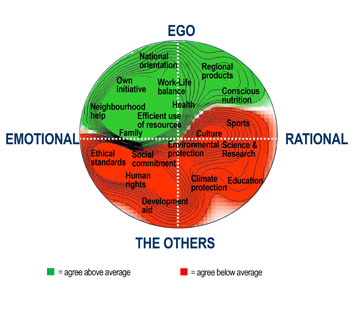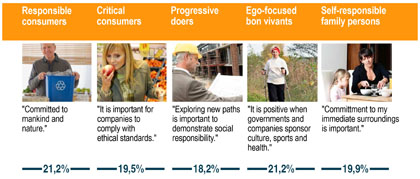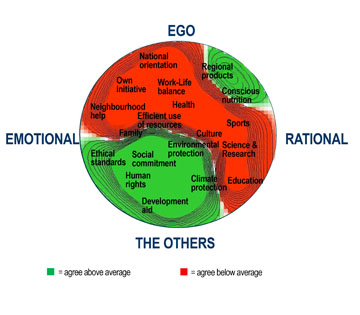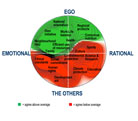| |
A. Corporate Responsibility as necessity
Corporate Responsibility (CR) is the responsibility of a business towards society, its employees, the environment and other surrounds. This includes a number of dimensions:
1. Education: training, further education, research …
2. Environment: nature conservation, environmental protection, recycling …
3. Health: nutrition, health services, sports …
4. Society: development aid, human rights, associations …
5. Labour: regional economic policy, trade unions, child labour, …
Numerous external drivers require manufacturers and suppliers to optimise the sustainability of their businesses. Macroeconomic changes (A) drive the move toward more sustainability (B), which is demanded by the stakeholders, thus leading to a need for action by suppliers and manufacturers (C):
(A) 1. Macroeconomic changes: growing world population , economic growth in emerging countries, increased life expectancy
(B) 2. Ecological challenges: shortage of raw materials (energy, water …), changes in climate …
(B) 3. Societal challenges: growing disparency between rich and poor, increase in lifestyle diseases …
(C) 4. NGOs
(C) 5. Retailers
(C) 6. Media
(C) 7. Politics
(C) 8. Investors
(C) 9. Consumers
Conclusion: Corporate Responsibility becomes a necessity for all players in the consumer industry. Corporate Responsibility …
… is not a passing phenomenon, but a longterm topic,
… is a major challenge for suppliers, manufacturers and retailers in the coming years,
… will dramatically change the rules of the entire consumer industry.
B. New Study
In the spring of 2009 GfK and Roland Berger completed a study based on GfK Panel Services' consumer panels. The aim of the study was a segmentation of consumers according to their attitudes towards environmental topics, ecology and Corporate Responsibility. Data base: the GfK household panel with 20,000 households.
In a holistic look at Corporate Responsibility, consumers were interviewed as to their attitudes towards CR. On this basis, CR profiles can be generated for individuals, groups or buyers of specific brands. The CR profiler reflects the totality of CR-relevant topics:

The study resulted in five types of consumers:
1. responsible consumers
2. critical consumers
3. progressive doers
4. ego-focused bon vivants
5. self-responsible family persons

Based on this study, CR profiles can be generated for different brands, products or other topics relevant for buying decisons. For example, the responsible consumer is active in human rights, development aid, nature conservation and climate protection:

Based on these results, Pro Carton commissioned the study " Packaging & Sustainability. Packaging in relation to Corporate Social Responsibility from the consumer point of view", which was to be presented for the first time at the congress.
C. Implications for the cartonboard and folded box industry
Corporate Responsibility represents a major challenge for the packaging industry, at the same offering big opportunities:
1. CR forms a triad of social, ecological and economic sustainability.
2. In the medium term, CR offers differentiation, prior to becoming the industry standard in certain fields.
3. CR must be viewed as part of the product life cycle, with suppliers playing a major role.
4. CR is a topic for senior management and elevates the discussion to a strategic level.
Graphs:
GfK, Roland Berger - Corporate Responsibility Study, Germany, May 2009
Contact at Roland Berger Strategy Consultants:
Regina Schmidt
Partner, Competence Center Consumer Goods & Retail
Tel. +49 (89) 9230-8747
E-Mail: regina_schmidt@de.rolandberger.com
|
 |
The study resulted in five types of consumers: |
 |
Based on this study, CR profiles can be generated for different brands, products or other topics relevant for buying decisons. For example, the responsible consumer is active in human rights, development aid, nature conservation and climate protection. |
|

